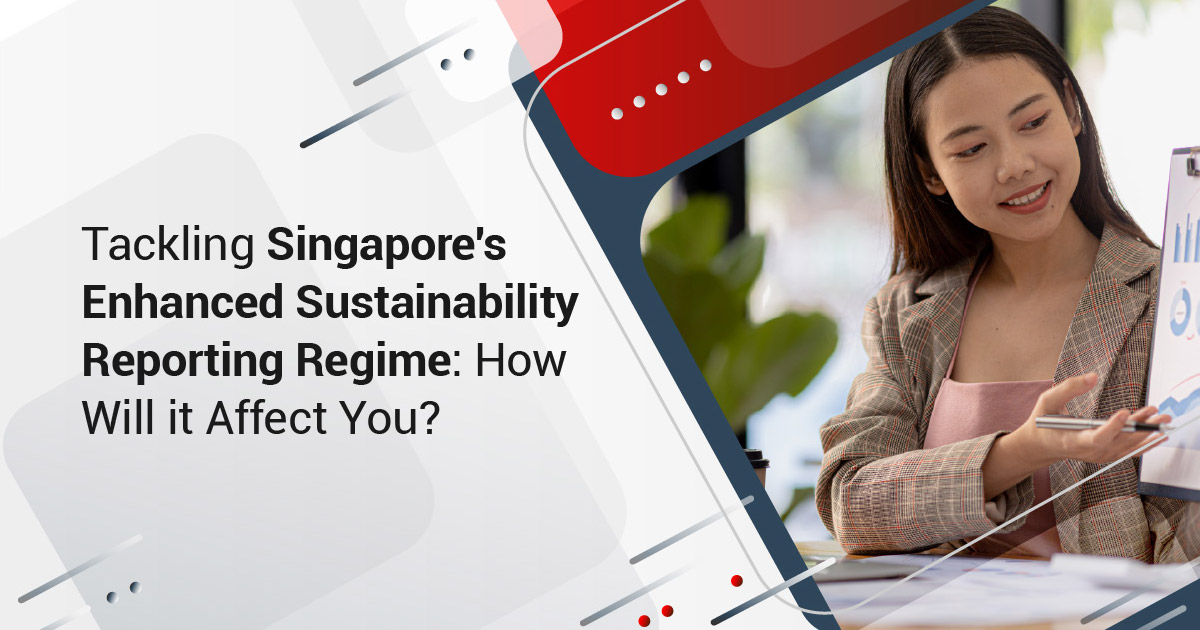Singapore has long been advancing towards prioritising sustainability, expanding its reach to businesses and individuals alike. Today, it is widely recognised that implementing sustainable measures into business models can provide a plethora of benefits, such as reducing environmental impact, boosting credibility and trust, and improving a company’s bottomline.
On 23 September 2024, the Singapore Exchange Regulation (SGX RegCo) announced that it will be adopting the newest standards developed by the International Sustainability Standards Board (ISSB), an international accounting standards body, into its sustainability reporting regime.
This blog delves into the highlights of the enhanced regime and how it will affect businesses moving forward.
What is the New Enhanced Sustainability Reporting Regime?
As of FY 2025, SGX RegCo has mandated all issuers to begin incorporating Scope 1 and Scope 2 greenhouse gas (GHG) emissions after receiving widespread support from respondents to a public consultation in 2024.
The issuers’ climate-related disclosures must also incorporate the climate-related requirements in the IFRS Sustainability Disclosure Standards issued by the ISSB.
This marks a change from the previous requirement of only certain industries having to perform mandatory climate-related reporting.
The disclosure of Scope 1 and Scope 2 GHG emissions is seen as a key move to support larger issuers to report their Scope 3 GHG emissions. Moving forward, SGX RegCo will review issuers’ experience and readiness before creating a roadmap for implementing the reporting of Scope 3 GHG emissions.
Timeline of Enhanced Sustainability Reporting Regime
| Financial Year | Listed Companies (ListCos) | Large Non-Listed Companies (NLCos) |
|---|---|---|
| FY 2025 |
|
|
| FY 2026 |
|
|
| FY 2027 |
|
|
| FY 2028 | ||
| FY 2029 |
|
What Are the Differences Between the Task Force on Climate-Related Financial Disclosures (TCFD) and IFRS S2?
| Aspect | TCFD | IFRS S2 |
|---|---|---|
| Governance |
|
|
| Strategy |
|
|
| Risk Management |
|
|
| Metrics and Targets |
|
|
InCorp’s risk assurance team, for example, is well-versed in sustainability reporting and assessment. We have in-depth knowledge of global sustainability reporting standards and are equipped with the experience required to effectively evaluate sustainability systems and processes.
Listen to Our Seminar: Navigating Consistency in Sustainability Reporting & Exploring Greenwashing and Legal Risks
Let InCorp Help You Navigate the Enhanced Sustainability Reporting Regime
The enhanced regime can seem confusing to navigate, but with our risk assurance team, you can gain a trusted partner in achieving ESG excellence and compliance. Our team possesses deep expertise in ESG compliance, ensuring your reports align with the latest regulatory standards and industry frameworks.
We streamline the entire process, from accurate data collection to preparation of the sustainability report, so you can focus on growing your business while remaining compliant.
Beyond compliance, we offer strategic insights to help integrate sustainability into the core of your long-term business operations, positioning you for success in a rapidly evolving ESG landscape. With our dedicated support, achieving transparency, stakeholder trust, and sustainability goals has never been more seamless. Contact us to find out more today!
FAQs about Singapore's Enhanced Sustainability Reporting Regime
What are the requirements for a sustainability report in Singapore?
- Some requirements include material ESG factors, climate-related disclosures, a sustainability reporting framework, and targets.
What is ESG reporting in Singapore?
- ESG reporting is a structured approach for companies to disclose their sustainability practices and impacts.
Is sustainability reporting a legal requirement?
- Yes, sustainability reporting is a legal requirement for all companies listed on the Singapore Exchange (SGX). It is also undergoing expansion to include other large entities in the future.



